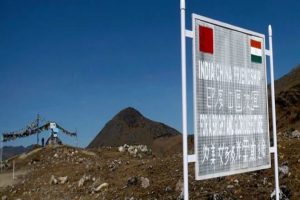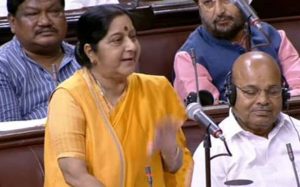 With the impasse deepening between the two Asian giants over their weeks-long border standoff, India has made it clear to China that “both sides must pull back troops and work things out with talks,” and underlined that other countries have backed India over the Doklam stand-off.
With the impasse deepening between the two Asian giants over their weeks-long border standoff, India has made it clear to China that “both sides must pull back troops and work things out with talks,” and underlined that other countries have backed India over the Doklam stand-off.
In a pointed speech in parliament on July 20, India’s External Affairs Minister Sushma Swaraj said that “both sides must pull back troops and work things out with talks” and stressed that India’s action (in sending its troops to the Doklam plateau last month) was motivated by its need to protect its security near where the boundaries of China, India and Bhutan meet.
“If China, unilaterally changes the status quo of the tri-junction point, it is a straight challenge to our security,” said Ms Swaraj.
“As long as it was between China and Bhutan, we had nothing to do with it,” said Mrs Swaraj. “But since this deals with the tri-junction point, it affects our security position.”
 Mrs Swaraj’s insistence on mutual withdrawal of troops came in the face of China’s reiteration of its stand that India must unilaterally withdraw as a precondition for any talks or dialogue. “The withdrawal of the Indian border troops is the precondition for any meaningful dialogue and the communication between the two sides,” said a government spokesperson at a press conference in Beijing.
Mrs Swaraj’s insistence on mutual withdrawal of troops came in the face of China’s reiteration of its stand that India must unilaterally withdraw as a precondition for any talks or dialogue. “The withdrawal of the Indian border troops is the precondition for any meaningful dialogue and the communication between the two sides,” said a government spokesperson at a press conference in Beijing.
The relations between the two Asian powers have been under severe stress for over a month after Chinese troops started building a road in the disputed Doklam plateau, which Bhutan claims as part of its own territory. India sent in its troops to stall the construction of the road as it would give the Chinese military access to the Chicken Point that links the mainland India with its seven north-eastern states.
India is insisting on diplomatic means to resolve the crisis amid aggressive rhetoric emanating from nationalistic state-controlled media in Beijing.
 In a sign that India is hoping that dialogue will resolve the impasse, National Security Advisor Ajit Doval will travel to China on July 27 for a meeting of national security advisers of BRICS grouping of emerging powers, comprising Brazil, Russia, India, China and South Africa. India is looking for a separate bilateral meeting between Mr Doval and China’s influential State Counsellor Yeng Jiechi on the sidelines of the BRICS meeting to explore ways to defuse the crisis.
In a sign that India is hoping that dialogue will resolve the impasse, National Security Advisor Ajit Doval will travel to China on July 27 for a meeting of national security advisers of BRICS grouping of emerging powers, comprising Brazil, Russia, India, China and South Africa. India is looking for a separate bilateral meeting between Mr Doval and China’s influential State Counsellor Yeng Jiechi on the sidelines of the BRICS meeting to explore ways to defuse the crisis.
Despite the Doklam standoff, latest signals suggest that Prime Minister Narendra Modi will travel to Xiamen in China for the 9th BRICS summit. In his meeting with Mr Modi at a BRICS meeting on the sidelines of the G20 summit in Hamburg on July 7, Chinese President Xi Jinping had praised the progress in consolidating the BRICS grouping under India’s presidency last year.
Author Profile
- India Writes Network (www.indiawrites.org) is an emerging think tank and a media-publishing company focused on international affairs & the India Story. Centre for Global India Insights is the research arm of India Writes Network. To subscribe to India and the World, write to editor@indiawrites.org. A venture of TGII Media Private Limited, a leading media, publishing and consultancy company, IWN has carved a niche for balanced and exhaustive reporting and analysis of international affairs. Eminent personalities, politicians, diplomats, authors, strategy gurus and news-makers have contributed to India Writes Network, as also “India and the World,” a magazine focused on global affairs.
Latest entries
 DiplomacyJanuary 5, 2026India walks diplomatic tightrope over US operation in Venezuela
DiplomacyJanuary 5, 2026India walks diplomatic tightrope over US operation in Venezuela India and the WorldNovember 26, 2025G20@20: Africa’s Moment – The Once and Future World Order
India and the WorldNovember 26, 2025G20@20: Africa’s Moment – The Once and Future World Order DiplomacyOctober 4, 2025UNGA Resolution 2758 Must Not Be Distorted, One-China Principle Brooks No Challenge
DiplomacyOctober 4, 2025UNGA Resolution 2758 Must Not Be Distorted, One-China Principle Brooks No Challenge India and the WorldJuly 26, 2025MPs, diplomats laud Operation Sindoor, call for national unity to combat Pakistan-sponsored terror
India and the WorldJuly 26, 2025MPs, diplomats laud Operation Sindoor, call for national unity to combat Pakistan-sponsored terror







